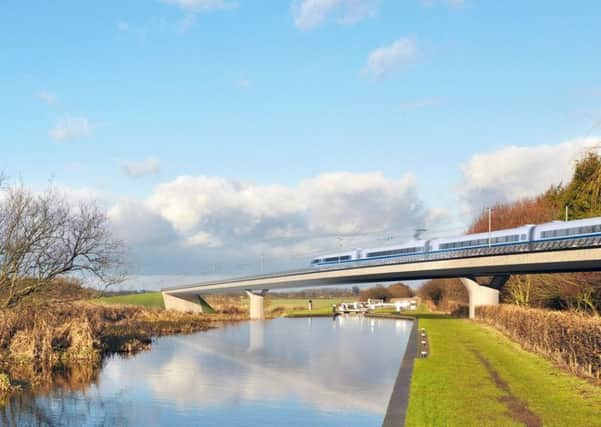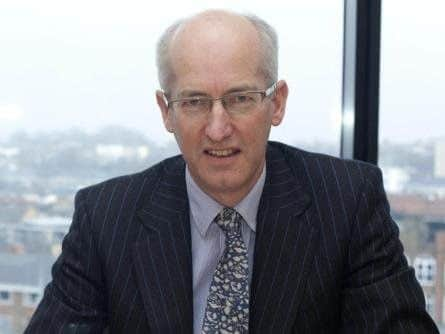Rail fares must be simpler if HS2 is to fulfil its potential, says firm's outgoing chairman David Higgins


Sir David Higgins, who today releases his final report as chairman of HS2 Ltd, says Yorkshire is already feeling the benefits of the 350-mile high speed track connecting London with Leeds, Manchester and Birmingham despite it not arriving in the region until 2033.
He says there are already 90 Yorkshire firms who have delivered work on the project, with a further 277 talking to HS2 about how to access and compete for contracts to deliver the programme over the next 15 years.
Advertisement
Hide AdAdvertisement
Hide AdIn his report, HS2: Realising the Potential, Sir David said there have been many “positive developments” for the project in recent years, but that “other challenges remain if we as a country are to realise the full potential of HS2 and get a full return on the nation’s investment in the project”.


Among the issues to be addressed are fares, as the former chief executive of Network Rail said the business case for HS2 assumes the same fares are charged across the HS2 network and the existing rail network.
He wrote: “Ticketing and fares need to be made simpler and more transparent to encourage people to travel by rail.
Advertisement
Hide AdAdvertisement
Hide Ad“There are now around 55 million different fares on Britain’s railways and passengers report low levels of confidence that they bought the best value ticket for their last journey.
“I am pleased to see that train operating companies recognise that the range of fare options has not kept pace with technology or how people work and travel today.
“Working with independent watchdog Transport Focus, the rail industry is consulting the public on what a future range of fares should look like.”
Among the other “fairly fundamental challenges” for planners include making sure Britain’s future transport network is designed to cope with changes to the way people live, work and play to avoid “falling back into the reactive, incremental way transport improvements were planned in the past”.
Advertisement
Hide AdAdvertisement
Hide AdAustralian-born Sir David also calls for local leaders to focus on broader benefits that spread beyond the areas immediately surrounding HS2 stations and making sure the proposed Northern Powerhouse Rail service connecting the great cities of the North is well integrated with HS2.
Phase One of HS2 connecting London to Birmingham is due to open in 2026, with Phase 2B of the 220mph service reaching Leeds by 2033, meaning journeys to the capital will be shortened to 81 minutes.
Sir David said that in the North, regions are working on making the most of HS2’s potential in their area in order to tackle the “unbalanced nature of our national economy between London and the South East, and the rest of the country”.
Advertisement
Hide AdAdvertisement
Hide AdHe cited the National College for High Speed Rail’s campus in Doncaster, which opened in October 2017, and the fast-growing legal sector in Leeds, whose 8,000 employees will be 50 minutes journey from Birmingham once HS2 is up and running.
Sir David said a decision was needed on whether to include provision for a parkway station on the route in South Yorkshire, a move which he called for the Government to consider two years ago.
It was announced last year that the route will run east of Sheffield, meaning homes on a housing estate in Mexborough will be demolished, with some trains going into the city via a new spur and existing lines.
The report also considers possible extensions of HS2 into Scotland, suggesting that using the East Coast Main Line via York, Darlington and Newcastle rather than the West Coast Main Line to Glasgow would “connect more centres of population and demand and deserves proper consideration”.
Advertisement
Hide AdAdvertisement
Hide AdSir David will today outline his report at Cloth Hall Court in Leeds to an audience of more than 100 regional business and civic leaders from across the country.
He said: said: “Britain invented the modern railway and it is right that, because of HS2, we have the opportunity once again to lead the world in this important sector.
“As we move towards construction, we are already seeing thousands of people around the country working to bring Britain’s new railway to reality. We’re in the middle of the largest programme of early works that the UK has ever seen, leading to major construction next year - supporting jobs and businesses around the UK and building the skills base we need to export around the world.”
Judith Blake, Leader of Leeds City Council and Member of the West Yorkshire Combined Authority, said: “Sir David’s call to maximise the impact of this project at a local and regional level is in lockstep with the Combined Authority’s work examining the best ways to integrate HS2 into regional transport links to bring the benefits of economic growth to all our communities.
“We have set out a strategy to deliver almost 150,000 jobs across the City Region as HS2 unlocks new business opportunities, creates high-skilled jobs, spurs regeneration and attracts investment.”